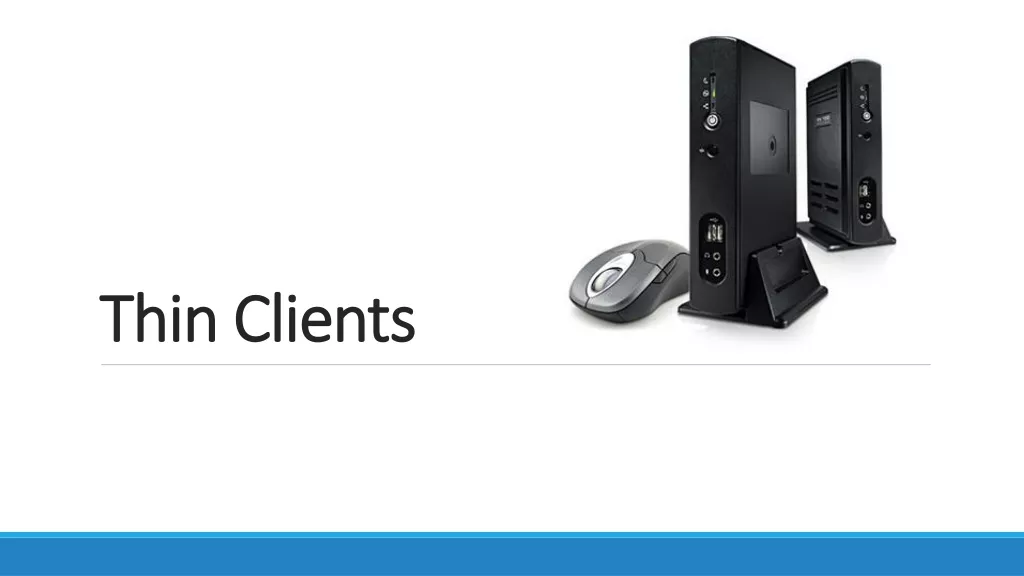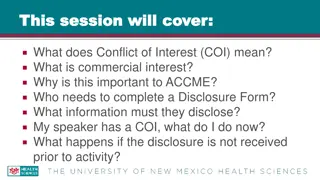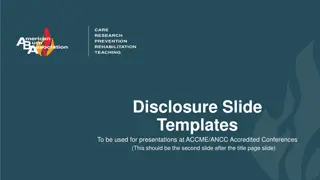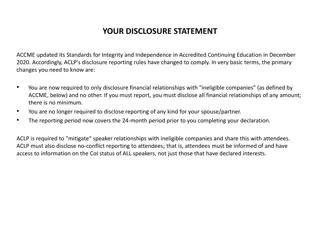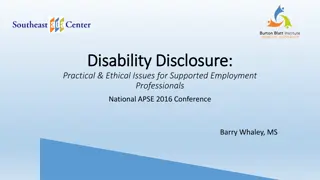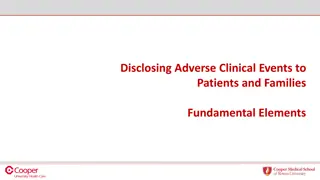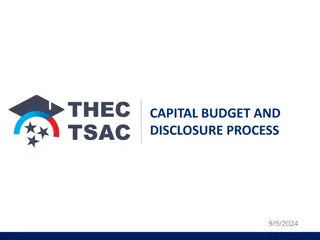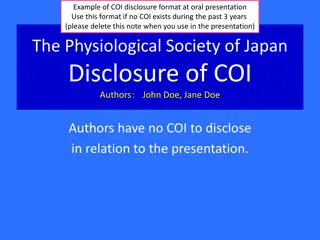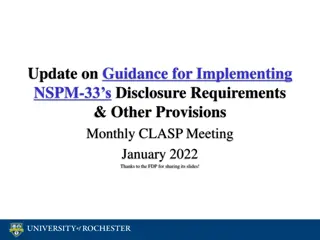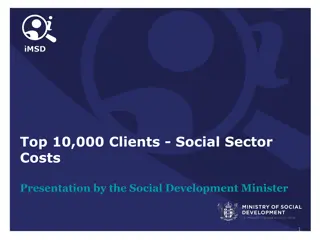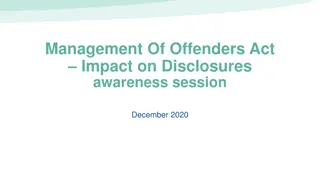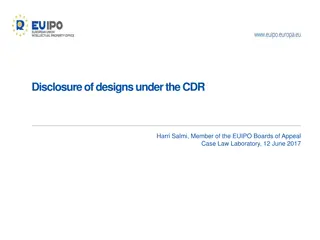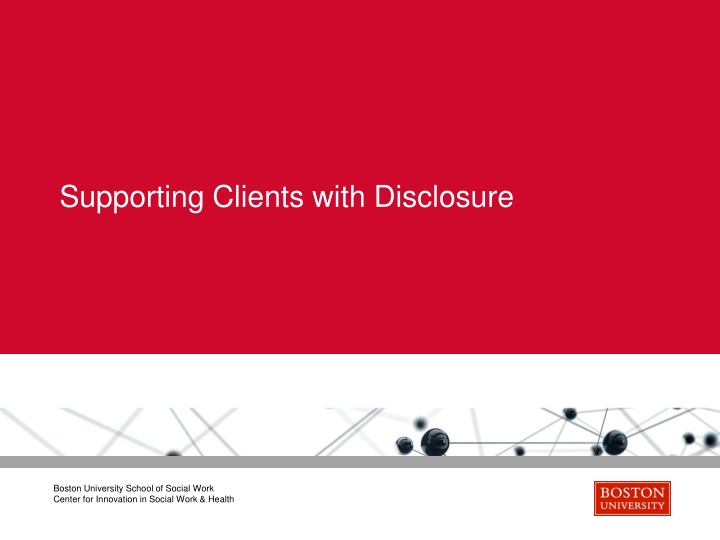
Supporting Clients with Disclosure: Strategies and Benefits in Social Work
Explore the complexities of disclosure in social work with the Boston University School of Social Work. Gain insights into defining disclosure, evaluating risks, and developing supportive strategies for clients. Discover the benefits of disclosure, such as fostering trust, reducing stigma, and enhancing community support.
Download Presentation

Please find below an Image/Link to download the presentation.
The content on the website is provided AS IS for your information and personal use only. It may not be sold, licensed, or shared on other websites without obtaining consent from the author. If you encounter any issues during the download, it is possible that the publisher has removed the file from their server.
You are allowed to download the files provided on this website for personal or commercial use, subject to the condition that they are used lawfully. All files are the property of their respective owners.
The content on the website is provided AS IS for your information and personal use only. It may not be sold, licensed, or shared on other websites without obtaining consent from the author.
E N D
Presentation Transcript
Supporting Clients with Disclosure Boston University School of Social Work Center for Innovation in Social Work & Health
Supporting Clients with Disclosure Objectives Boston University Slideshow Title Goes Here At the end of this unit participants will be able to: Define Disclosure Identify risks and benefits of disclosure for self and clients Develop strategies to assist clients in weighing the risks and benefits of disclosure Develop strategies to support clients through the disclosure process Use resources to support clients with disclosure to family, intimate partners, and providers
Supporting Clients with Disclosure Supporting Clients with Disclosure Boston University Slideshow Title Goes Here Disclosure Disclosure of HIV status is a difficult decision for clients. Disclosure is personal and private. It is a choice, however there are: Risks and benefits Impact on others Impact on self
Supporting Clients with Disclosure Supporting Clients with Disclosure Boston University Slideshow Title Goes Here Disclosure is a Continuum Self-disclosure: reveal something about ourselves that is not readily apparent Decisions to self-disclose vary with circumstances Outcomes of self-disclosure varies as well There is no perfect roadmap for how to disclose
Boston University Slideshow Title Goes Here ACTIVITY: RISKS AND BENEFITS OF DISCLOSURE
Supporting Clients with Disclosure Supporting Clients with Disclosure HIV Disclosure- Benefits Boston University Slideshow Title Goes Here Encourages a person to be open (free) to receive trusted support Allows a person to keep close friends and loved ones informed about issues important to them Reduces anxiety, fear, and worry Helps a person feel better about themselves Helps a person be more authentic with people they trust Decreases the need to be secretive (e.g., hiding medications), enabling them to receive support (e.g., for medication adherence) Helps reduce stigma associated with HIV Fosters community with others who are living with HIV Reduces mental stress Adheres to legal disclosure laws for some states
Supporting Clients with Disclosure Supporting Clients with Disclosure HIV Disclosure- Risks Boston University Slideshow Title Goes Here Stigma Risk of discrimination (i.e. impact on career and/or personal life) Risk of criminalization Emotional or physical harm People will not respect privacy fear of others Rejection Lack of strong social network Feeling ashamed, guilty, dirty, judged as irresponsible (e.g., can t protect him/herself) Homophobia Burdening others
Supporting Clients with Disclosure Supporting Clients with Disclosure Boston University Slideshow Title Goes Here Stages of Change and Disclosure Pre-contemplation Reconsidering (Relapse) Contemplation Preparation Maintenance Action
Supporting Clients with Disclosure Supporting Clients with Disclosure Boston University Slideshow Title Goes Here General Guidelines for Telling Others You Are HIV Positive
Supporting Clients with Disclosure Supporting Clients with Disclosure Disclosure Tips: Preparation, Action, and Boston University Slideshow Title Goes Here Behavior Prepare get informed about HIV Leave resources (e.g., articles or a hotline phone number) for the person you tell Get support Talk it over with someone you trust, and come up with a plan Accept the reaction You can t control how others will deal with your news If telling a significant other or partner, other resources or fact sheets on U=U or PrEP may be helpful Source: http://www.thebody.com
Supporting Clients with Disclosure Disclosure Tips Continued Boston University Slideshow Title Goes Here Be selective Consider the 6 W s 1. Who do you tell? 2. What do you want to tell them about your HIV status? 3. What are you expecting from the people you are disclosing your HIV status to? 4. When should you tell them? 5. Where is the best place to have this conversation? 6. Why are you telling them?
Supporting Clients with Disclosure Supporting Clients with Disclosure Self-Care Tips and Considerations Boston University Slideshow Title Goes Here As a CHW What can you do to take care of yourself when you are working with a client on disclosure? What do you need to consider when working with a client on disclosure? What are some guidelines you would suggest to a client when they are getting ready to disclose their HIV status? Source: http://www.thebody.com/
Supporting Clients with Disclosure Supporting Clients with Disclosure CHWs and Self-Care Boston University Slideshow Title Goes Here Supporting and coaching clients on disclosure can be stressful. CHWs may feel pressure (from themselves or the client) to give advice, and in turn, feel frustrated when clients don t follow through. Go at the client s pace and know your limits. Remember that disclosure is a decision for your client to make; not you. Other ways of handling stressful situations are to: Try physical activity Be sure to get rest and eat well Talk about it
Supporting Clients with Disclosure Tips and Considerations for CHWs in Boston University Slideshow Title Goes Here Working with Clients around Disclosure CHWs can help clients consider why they want to disclose. Encourage clients to arrange a comfortable, appropriate time and place for the discussion. Tone has a lot to do with how people might hear what you re telling them. Being calm and matter of fact may help inform their reaction and minimize their fears. Clients should make sure they are emotionally and physically safe. Clients may anticipate how the person might react to the disclosure. Encourage clients to ask for what they want and do not want from the person they are disclosing to.
Supporting Clients with Disclosure Supporting Clients with Disclosure Boston University Slideshow Title Goes Here
Supporting Clients with Disclosure Supporting Clients with Disclosure Boston University Slideshow Title Goes Here How Can a CHW Help This Client? A client is struggling with disclosure to children. A.Convince the client to only tell older children. B.Role-play different scenarios with the client. C.Tell the client to consult a therapist first. D.Advise the client to be open and honest, only answering questions asked.
Supporting Clients with Disclosure Supporting Clients with Disclosure HIV Grief and Disclosure Boston University Slideshow Title Goes Here Review the 7 Stages of Grief handout. Disclosure can be more difficult if a client has not gone through the grieving process. Stages of grief can help identify where clients are in the process. CHWs can review the stages with clients.
Supporting Clients with Disclosure Supporting Clients with Disclosure Countertransference and Disclosure Boston University Slideshow Title Goes Here CHWs cannot do this work and not be affected. CHWs may experience intense feelings towards clients with disclosure-related issues. CHWs may have a bias towards disclosing. Identifying feelings and beliefs in supervision can help CHWs meet clients where they are at.
Supporting Clients with Disclosure Supporting Clients with Disclosure Boston University Slideshow Title Goes Here Case Scenarios: HIV Disclosure
Supporting Clients with Disclosure Supporting Clients with Disclosure Boston University Slideshow Title Goes Here What Is Your Confidence Level in Supporting Clients Disclosure Decisions? Discussion question: How confident are you in your ability to support (assist, help) clients in making decisions related to disclosure? 1. Very confident 2. Confident 3. Somewhat confident 4. Not confident Are there special situations that involve disclosure? What additional supports are needed to help you?
Supporting Clients with Disclosure Supporting Clients with Disclosure Summary Boston University Slideshow Title Goes Here Many people with HIV feel a need to tell their story. They also benefit from hearing other people s stories. Talking to each other about disclosure provides a forum in which change feels possible for them. Disclosing allows people with HIV to share their experience with others. Disclosure is personal and private; it is always the client s choice, not yours.
Supporting Clients with Disclosure Supporting Clients with Disclosure Resources Boston University Slideshow Title Goes Here PEER Center: https://ciswh.org/project/peer-center/ Eight HIV-Positive Folks Talk (Anonymously) About Why They Stay in the HIV Closet (April 24, 2018), From The Body: https://www.thebody.com/slideshow/eight-hiv-positive-folks-talk- anonymously-about-why-they-stay-in-the-hiv The Stages of Change: http://www.cpe.vt.edu/gttc/presentations/8eStagesofChange.pdf Become a Better Listener: Active Listening | Psych Central, By John M. Grohol, Psy.D https://psychcentral.com/lib/become-a-better- listener-active-listening/ 7 Stages of Grief: www.recover-from-grief.com/7-stages-of-grief.html

